|
Testing
Foolhardy, a 16' Sharpie
by Dave Gray polysail@aol.com
Visit Dave's website at: https://hometown.aol.com/polysail/HTML/index.htm
| On a late Friday afternoon in September, I added
some finishing touches to the trailer that would carry my version of a Cape Cod Sharpie
skiff to the annual Lake Monroe (Indiana) Messabout for the weekend. This event would mark
the first time in the water for my Sharpie-inspired design, and I was eager to put Foolhardy
to the test. At the same time, I felt a little reluctant to try out the boat out in
front of my boat-building colleagues. My few sailing skills had become rusty during the
summer as I labored to build just one more boat; and since Foolhardy was my first
"from scratch" design and build effort, I just didn't want to be embarrassed. Two days before, with the weekend looming, I had decided that I was
going to have to take some shortcuts in order to get the Sharpie ready to sail. To that
end I pirated the kick-up rudder and fastenings from my Bolger Cartopper then gave the
mechanism a quick coat of Hunter green enamel to match the bottom paint on the new skiff.
I hoped the paint would dry enough to last the weekend. The next evening I constructed a
new polytarp spritsail for the hastily-constructed 18' 6" PVC/aluminum mast and added
the necessary hardware to handle the sail. Again, some of the mast hardware was lifted
from the Cartopper. |
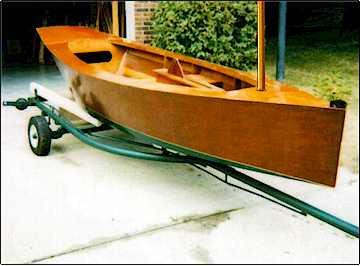
|
The trailer was about to undergo
initial testing as well as the boat. For $40 I had purchased one of the worst looking
trailers on the block at the abandoned trailer and boat auction sponsored by the
Indianapolis Sailing Club. Finding that the trailer was structurally sound under the
light coating of rust, I had scraped and painted it, replaced a wheel and bearings,
replaced light bulbs, and made new wooden skids. |
| But, other than the short, five-mile pull from the
Sailing Club to my home, the trailer probably hadn't been on the road in15 years. The
wiring was suspect, and I was more than a little apprehensive about the trailer's
potential performance as I struggled to get it ready for the 60 mile trip. I had hoped to
leave by 2:00 and suddenly it was 5:30 p.m. and the midst of rush hour. I quickly stowed lifejacket, oars, and cooler in the boat then
stuffed the remaining gear and overnight bag into the bed of my pickup. Hoping that
nothing had been forgotten and that fate was on my side, I headed south around
Indianapolis on a very busy Interstate. For a short while the gods were with me. I stopped
just in time to tighten the tiedowns when the boat appeared slightly off center in my
mirrors. Actually, the boat had been slipping slowly backwards and was about to blow
completely off the trailer. Meanwhile my newly purchased winch still lay in the back of
the truck--one more piece of equipment that didn't get installed. After adding another
tiedown, I secured the painter to the trailer to keep the boat from moving backward, and
pulled out of the parking area. |
| Just as I reached the traffic signal,
I heard a loud, whirping siren and saw flashing lights immediately behind me. Damn! I knew
I should have spent more time making certain that those trailer lights functioned. Since I
had the light, I pulled slowly around the corner and off to the side of the highway.
Curses and self recriminations turned quickly to sighs of relief as the police car whipped
around my trailer and turned away at the intersection. |
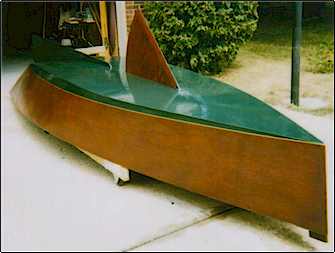 |
| I was still enjoying my good fortune as the dusk
deepened into a moonless night. The trailer was pulling well and I was just a few miles
from my Bloomington destination where I hoped to spend the night before heading to the
Paynetown State Recreation Area in the morning. Suddenly, my dash lights, running lights,
trailer, and stoplights went dark. After stopping to inspect, I discovered that only my
headlights and emergency flashers were working. Pushing my luck, I decided to drive on to
the motel, hoping that no one would run into me on a dark night now turned even darker. |
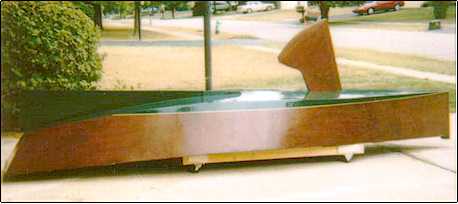 |
Just before I reached my motel, I
found an auto parts store that was still open. With the help of one of the clerks, I
located and replaced the blown fuse |
| and vowed that I would replace the guilty ground
wire that had caused this problem as soon as I got up in the morning. |
| Arriving at the motel, I joined up with fellow
boatbuilder Chris Flynn and his wife Elaine for dinner at the Red Lobster. Chris is one of
my PolySail customers who had recently completed a very finely-crafted Bolger/ Peyson
Bobcat. Over dinner, we talked boats and trailer problems, and looked forward to a
beautiful late summer Saturday. The forecast was for sunny weather with highs in the lower
80's and light and variable winds. |
On Saturday I made good on my
promise (I thought) to correct the trailer wiring problem and drove to the lake. (On the
return trip that evening, I was to find that I hadn't solved the problem at all and ended
up spending another night in a motel to await daylight.) Shortly after breakfast, I was
able to test the Sharpie and my new sail in light air (3-6 knots). Then, later in the
afternoon, I was able to try her out again in a breeze of about 10 knots. She rode in the
water just as she was supposed to with the bow out of the water about two inches and the
transom out about four inches. |
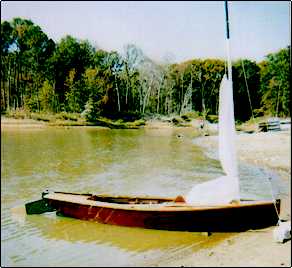 |
| As expected, the boat was fast and fun to sail. It
sailed best "on the chine" at an angle of about 15 degrees of heel. With the
long skeg on the back, it was easy to keep the boat going straight. I usually didn't even
have to hold onto the tiller to keep the boat going straight. That meant that I was easily
able to go forward to make adjustments to the sail and snotter--the rope that holds the
front end of the sprit boom--and the boat just wouldn't lose course. (The snotter has
several knots in it so that you can adjust sail shape easily.) |
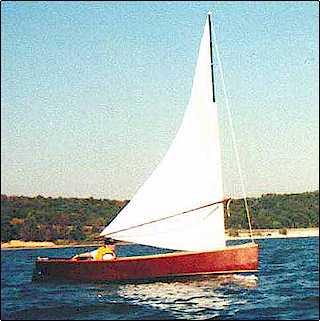 |
Two things that I didn't like much were the mast
and the turning radius. The PVC/aluminum mast was just too easily bent. That flexibility
was good in that the sail easily dumped air in the event of a gust; but bad in the sense
that I couldn't get faster acceleration out of the wind gusts when they came up. The very
flexible mast also meant very little heeling when there was a gust, so the boat itself was
very stable. Except in big gusts, I had to lean leeward instead of windward as you
normally would to get the boat to sail "on the chine" instead of just sailing
flat. |
| The wide turning radius was probably due to too
much skeg or too little centerboard down. I had to move up toward the centerboard and put
the rudder full over when I wanted to execute a turn. If I didn't move forward, moving the
rudder had very little turning effect. Part of this problem might also be due to the fact
that the centerboard was only extended about 8" of its 32" length. Nor did I
have anything aboard to push it down to anything like its full extension. There were lots of motorboats on the reservoir, but the boat handled
the choppy water and waves pretty well. I didn't see any water come into the boat over the
high bow. Some did get in along the chines, however. There were a lot of rocks where I
launched, and I'm afraid one of these nicked the chine enough to cause a small leak. Wish
I'd had time to fiberglass the sides and corners like I did the bottom. |
| I guess I still have some
"fine tuning" to do to make the Sharpie all that I want it to be. I'm looking at
a new wood mast, an inch or so off the skeg, some more fiberglassing, new trailer wiring,
a winch for pulling the boat onto the trailer, a protective cover, and the name on the
transom before I feel like it's finished. I'm really pleased though about its speed,
handling, and stability. I received several positive comments about its appearance and
speed from the other participants, including Jim Michalak, a well-known Midwestern
designer of home-built boats. |
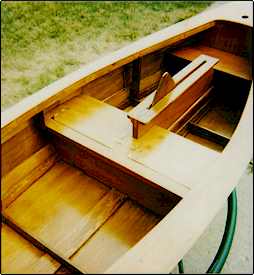 |
| However, I was personally most satisfied with her
stability. I had expected a 16' boat with a 3' 4" waterline beam to be far more
"nervous" on the water. |
| I would be pleased to hear from other home
boatbuilders and enthusiasts. Let me know what you think by e-mailing me at polysail@aol.com Dave Gray |

|